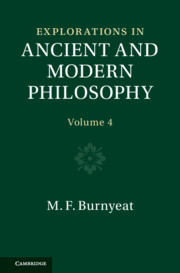Book contents
- Explorations in Ancient and Modern Philosophy
- Explorations in Ancient and Modern Philosophy
- Copyright page
- Contents
- Illustrations
- Preface
- Acknowledgements
- Abbreviations
- Introduction
- Part I Ontology and epistemology
- Chapter 1a Apology 30b2–4: Socrates, money, and the grammar of γίγνεσθαι
- Chapter 1b On the source of Burnet’s construal of Apology 30b2–4: a correction
- Chapter 2 Plato on how not to speak of what is not: Euthydemus 283a–288a
- Chapter 3 Platonism in the Bible: Numenius of Apamea on Exodus and eternity
- Chapter 4 Kinēsis vs. energeia: a much-read passage in (but not of) Aristotle’s Metaphysics
- Chapter 5 De Anima ii.5
- Chapter 6 Aquinas on ‘spiritual change’ in perception
- Chapter 7 Epistēmē
- Part II Physics and optics
- Bibliography
- Index locorum
- References
Chapter 5 - De Anima ii.5
from Part I - Ontology and epistemology
Published online by Cambridge University Press: 24 March 2022
- Explorations in Ancient and Modern Philosophy
- Explorations in Ancient and Modern Philosophy
- Copyright page
- Contents
- Illustrations
- Preface
- Acknowledgements
- Abbreviations
- Introduction
- Part I Ontology and epistemology
- Chapter 1a Apology 30b2–4: Socrates, money, and the grammar of γίγνεσθαι
- Chapter 1b On the source of Burnet’s construal of Apology 30b2–4: a correction
- Chapter 2 Plato on how not to speak of what is not: Euthydemus 283a–288a
- Chapter 3 Platonism in the Bible: Numenius of Apamea on Exodus and eternity
- Chapter 4 Kinēsis vs. energeia: a much-read passage in (but not of) Aristotle’s Metaphysics
- Chapter 5 De Anima ii.5
- Chapter 6 Aquinas on ‘spiritual change’ in perception
- Chapter 7 Epistēmē
- Part II Physics and optics
- Bibliography
- Index locorum
- References
Summary
This is a close scrutiny of De Anima II.5, led by two questions. First, what can be learned from so long and intricate a discussion about the neglected problem of how to read an Aristotelian chapter? Second, what can the chapter, properly read, teach us about some widely debated issues in Aristotle’s theory of perception? I argue that it refutes two claims defended by Martha Nussbaum, Hilary Putnam, and Richard Sorabji: (i) that when Aristotle speaks of the perceiver becoming like the object perceived, the assimilation he has in mind is ordinary alteration of the type exemplified when fire heats the surrounding air, (ii) that this alteration stands to perceptual awareness as matter to form. Claim (i) is wrong because the assimilation that perceiving is is not ordinary alteration. Claim (ii) is wrong because the special type of alteration that perceiving is is not its underlying material realisation. Indeed, there is no mention in the text of any underlying material realisation for perceiving.
- Type
- Chapter
- Information
- Explorations in Ancient and Modern Philosophy , pp. 155 - 212Publisher: Cambridge University PressPrint publication year: 2022

